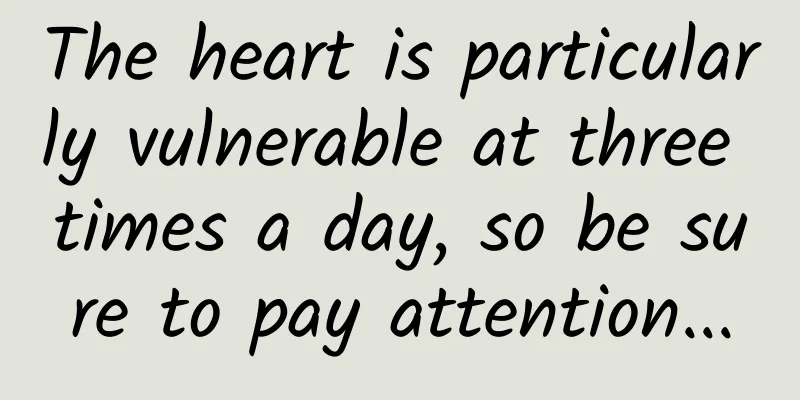The heart is particularly vulnerable at three times a day, so be sure to pay attention...

|
The heart is the "engine" of the human body. It continuously pumps blood to deliver energy and oxygen to the whole body. However, this seemingly powerful organ is actually very fragile, especially at certain times of the day. Today, Dr. Zeqiao will take you to understand the most vulnerable moments of the heart and provide practical heart protection suggestions . The heart's biological clock First, we need to understand that the heart has an internal "biological clock". It will show different physiological rhythms at different times of the day. For example, the heart rate is faster during the day and slower at night. Therefore, to protect the heart, we need to know when it is most "vulnerable". The three most vulnerable periods of the heart 1. When you get up in the morning , the sympathetic nerves are abnormally excited, our heart rate will change from slow to fast , blood pressure will rise, and emotions will be easily excited. Especially for high-risk groups such as those with hypertension and dyslipidemia, if they are eager to move at this time, cardiovascular events may be induced. Therefore, we recommend: - Don't rush to get up when you get up, you can lie down for a while and let your body slowly adapt. Drink a glass of warm water after waking up to help dilute the blood and promote blood circulation. Try to have a light breakfast and avoid greasy and salty foods. 2. During the period from 9 to 11 a.m. , blood pressure is at its highest point of the day , the sympathetic nerves are excited, and people tend to feel excited. At the same time, muscles are in a state of flexible movement. The superposition of multiple factors may lead to unstable plaques and increase the risk of cardiovascular diseases such as angina pectoris and myocardial infarction. Zeqiao original copyright contact We recommend: - Don’t eat too much for lunch, take a walk after the meal, and try to take a half-hour nap. When you're stressed or in a bad mood, try taking deep breaths to increase the oxygen level in your blood and relax your nerves. 3. After a morning of work, the body and brain may enter a state of fatigue from 3 to 5 p.m. At this time, blood pressure reaches a peak again , which can easily induce accidents such as angina pectoris and myocardial infarction. We recommend: - Stand up and move around during work breaks and avoid sitting for long periods of time. Don't overeat at dinner. Avoid using your phone for a long time before going to bed. You can relax by reading or listening to music. Recognize 4 danger signs from your heart Then, we also need to learn to recognize the warning signs sent by the heart. If the following symptoms occur, you need to be alert: 1. Chest tightness and chest pain , especially those that occur suddenly and cannot be relieved or occur frequently, may be a warning sign of myocardial infarction. 2. Unexplained stomach discomfort , even without chest tightness or pain, may be related to heart problems. 3. If you experience blacking out or temporary loss of consciousness , especially if you have a history of heart disease, you should seek medical attention immediately. 4. Palpitations, shortness of breath or fatigue , especially after overexertion or heavy smoking. In addition, some physical manifestations may also be clues to heart disease, such as earlobe creases, thick neck, irregular pulse, ankle edema, and cold toes . Zeqiao original copyright contact 6 good habits to protect your heart 1. Control your diet: Eat more fruits and vegetables and whole grains, at least 1 pound of vegetables and half a pound of fruits every day, and you can replace part of the staple food with some coarse grains. Eat enough protein, eat more white meat such as fish and chicken, and reduce red meat intake. Eat less salt, no more than 5 grams per day. 2. Adequate sleep: Adults should ensure 7 to 8 hours of sleep every night, and the elderly should ensure at least 5 to 6 hours of sleep. 3. Regular exercise: Do at least half an hour of aerobic exercise every day, such as jogging, swimming, Tai Chi, yoga, etc., at least 3 times a week. Pay attention to monitoring your heart rate during exercise and make sure it does not exceed 20% of your basal heart rate . 4. Drink 5 glasses of water: Adults should drink 1500-1700 ml of water every day. Heart patients should drink small amounts and multiple times. 5. Quit smoking and limit alcohol consumption: Avoid all forms of tobacco and limit alcohol intake to no more than 25 grams per day for adult males and 15 grams per day for females. 6. Maintain a good attitude: Reduce the secretion of stress hormones through deep breathing, meditation, music therapy and other means. In short, heart health cannot be ignored. Understanding the heart's "biological clock" and its vulnerable moments and taking appropriate preventive measures can effectively reduce the risk of cardiovascular disease. I hope today's sharing can help everyone better protect their hearts and enjoy a healthy life! |
<<: New blood test method: A sharp eye for identifying Alzheimer's disease
>>: Drinking for fun? Beware of alcoholic liver disease
Recommend
Black blood clots and sticky substances in menstruation
Menstruation is a normal physiological phenomenon...
Why is my period delayed for a week?
Menstruation is a woman's menstruation. Wheth...
How is ocean snot formed? How deep is the ocean?
70% of the Earth's total surface area is cove...
What category of substances does iodine belong to? Is iodine a colloid?
Iodine tincture, also known as iodine tincture, i...
Wow! It turns out that our food contains so much "technology and hard work"!
Reviewer: Wang Guoyi Postdoctoral fellow in Nutri...
What tests are done to check if the fallopian tubes are blocked?
As we all know, the fallopian tubes are very impo...
What is the meaning and symbol of golden peanuts? Will red-skinned peanuts fade when soaked in water?
As a symbol of good fortune and happiness, peanuts...
My period came back after my hysterectomy
Hysterectomy is a gynecological surgical treatmen...
The benefits of iron supplementation for women
Due to women's special physiological phenomen...
Methods to prevent moderate to severe cervical erosion
Cervical erosion is a disease that varies in seve...
Can I get pregnant one year after an abortion?
Pregnancy itself is a happy thing, but the curren...
Age and symptoms of amenorrhea in women
Menstruation is a unique physiological phenomenon...
Is it normal for pregnant women to sweat while sleeping?
Pregnant women are very prone to sweating, and sw...
Best time for women to conceive
As the Chinese say, there are three types of unfi...
What are the best ways to treat vulvar leukoplakia?
For friends suffering from vulvar leukoplakia, it...









